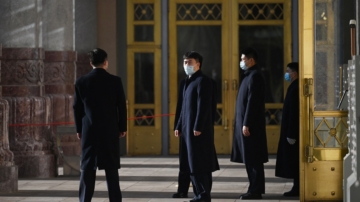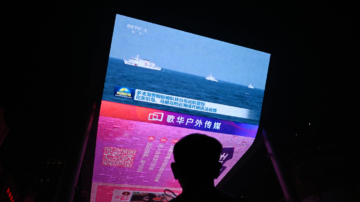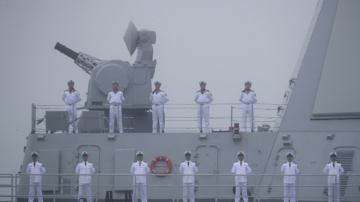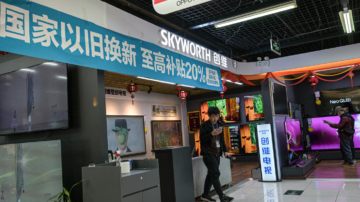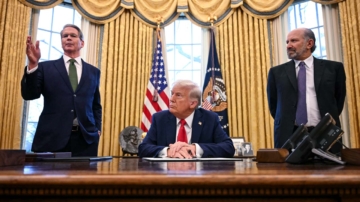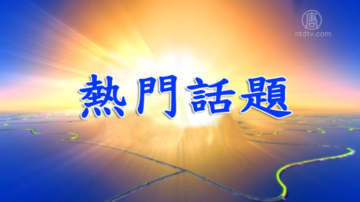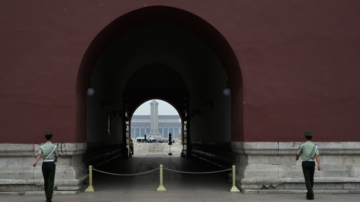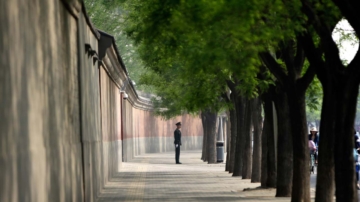【新唐人2015年01月17日讯】1月15号,中共一次性对外公布了2014年的“军中打虎榜”,显示有16名军级以上军官在军队反腐中落马。同一天,中共党媒以中共总书记习近平反腐“绝不封顶”发表文章,来表明习近平今年的打虎动向。外界认为,习近平的这些举动,是在敲打前中共党魁江泽民在军中的将领。
15号,中共军网报导,2014年军队查处军级以上干部的重大贪腐案件情况,由军队权威部门当天对外公布,去年共有16名军级以上军官落马。
除了已经对外公布的中央军委原副主席徐才厚,四川省军区原政委叶万勇等落马军官外,还包括总后勤部副部长刘铮,因涉嫌违法犯罪,在去年11月被军事检察机关立案侦查。早前去职而不知去向的兰州军区原副政委、中央候补委员范长秘,也在上个月被军事检察机关立案侦查。
据香港媒体报导,刘铮与徐才厚在中共总政治部共事多年,被指是徐的嫡系。而徐才厚被外界公认为是江泽民的“军中代言人”。
旅美时政评论员蓝述:“公布一批军队里面腐败将领的名单,它能够起到对军队里面江系将领的震慑作用,让他们不要乱说乱动,有利于习近平掌握军队。”
消息发布后,中共纪检监察学院原副院长李永忠向媒体承认,军队的权力更集中,军队经商办企业,入伍、入党、提干提职要给钱,都是造成军队腐败的原因。而腐败情况严重,呆账大量存在,又给军中反腐造成很大困难。李永忠还指出,军队腐败问题,和党政机关、央企国企的腐败问题,其实同病同源。
纽约城市大学政治学教授夏明:“一方面渲染国际上的军事威胁,一方面又强调国内国防建设的重要性,军队获得大量的拨款,随之腐败滋生。”
去年4月,几位总政机关知情干部,就曾在网路上发布《致习近平和全军的第二封公开信》。信中披露了兰州军区原副政委范长秘花1千万买官的事情。
信中写道:范长秘来北京请谷俊山吃饭,谷俊山向范长秘承诺喝一杯给他拨100万。范长秘连喝38杯,谷俊山一次性给47军下拨四、五千万。范长秘从中一次性拿出1000万,送给某位中央军委副主席的儿子。不久,范长秘果然被提为兰州军区政治部主任。
面对中共军队深不见底的腐败黑洞,在公布16名军级以上将领落马的同一天,中共党媒用习近平的讲话——反腐“绝不封顶”,来形容今年的反腐态势。
《亚洲新闻周刊》总监黄金秋:“过去军队的腐败谁都知道的,但是通过这种反腐短期是有效的,长期有没有效,还是可能需要更多的监督机制。”
旅美时政评论员蓝述则认为,习近平这句话,另有所指。
蓝述:“一般的理解就是,他要反腐的下一个对像要比周永康更高,既然比周永康更高,在这种反腐这么严峻的形势下,掌握军队就成了习近平不得不要做的事情。”
前不久,《凤凰周刊》刊发封面报导,称周永康与薄熙来结党营私,密谋政变,企图大干一场。《法国广播电台》认为,这一透露表明,周永康犯下政变的滔天大罪,比巨额贪污还要严重得多。不过评论认为,中共司法审理周永康的贪腐经济犯罪,可能不会涉及政变的政治指控。
据报导,2011年11月,时任中共军委主席胡锦涛外访期间,当时任职重庆市委书记的薄熙来大搞军事演习,成都军区、西藏军区的司令、政委纷纷到场,支持薄熙来。
而在这次的16名落马将领中,西藏军区副政委卫晋,成都军区副司令员杨金山就名列其中。
黄金秋:“当然如果涉及到薄熙来兵变或许政变,肯定是要处理的,不管他贪不贪腐都要处理的,正好有涉及贪腐,这个方式更方便一点,这个也不奇怪,但是即使不涉及薄熙来,也还是有很多贪腐的官员。”
香港《经济日报》报导称,军网主动披露16名落马军级将领,不同寻常,预料会继续打大老虎。
采访编辑/刘惠 后制/葛雷
16 Military Officers Sacked; A Warning to Jiang’s Faction,
Analysis Says.
On Jan. 15, the Chinese Communist Party (CCP) released
a list of military officers sacked in 2014 for severe corruption.
This showed 16 high level officers were taken down
under the anti-corruption campaign.
On the same day, CCP media reported an article about
the Chinese communist general secretary Xi Jinping’s
speech that says “anti-corruption is absolutely uncapped.”
It shows the trend of Xi’s anti-corruption this year.
The public opinion believes that Xi’s action is to warn military
leaders who follow former communist leader Jiang Zemin.
The CCP military website reported on Jan.15 that 16 officers
above major-general level were sacked in 2014.
Those investigated include: former Central Military
Commission vice chairman Xu Caihou;
Former Sichuan military region commissar
Ye Wanyong;
Vice minister of General Logistics Liu Zheng was
investigated last November suspected of crimes; and
Former deputy political commissar of Lanzhou Military
Region Fan Changmi was investigated in January.
Hong Kong media reported that Liu Zheng and Xu Caihou
worked at the CCP General Political Department for years.
Liu is considered to be Xu’s loyalist. The public considers Xu
to be the military spokesperson of Jiang Zemin.
Lan Shu, political commentator living in the U.S.,“Releasing
a group of corrupt military leaders names as a list can warn
the military leaders of Jiang’s faction, so that they don’t dare
to speak or act freely of their own will.
It’s in favor of Xi controlling the military.”
After releasing the information, former vice president of the
Chinese Discipline Inspection Institute Li Yongzhong told
Chinese media how power in the military is so concentrated.
Briberies among military businesses, on joining the military,
joining the party, promotion are among military corruptions.
Severe corruptions and large amount of bad debts
create huge difficulties for anti-corruption in military.
Li Yongzhong said military corruption has the same root as
corruptions in party government organizations.
It is also the same as corruptions in
central and state enterprises.
Xia Ming, professor of Political Science at City University of
New York, “[The military] on one hand renders international
military threats, and on the other hand emphasizes on the
importance of domestic defense construction.
The military received a large amount of funding,
which was followed by corruption.”
In April 2014, several insider cadres at the general political
offices published an open letter on the internet, exposing
how former deputy political commissar of Lanzhou Military
Region Fan Changmi bought his position for 10 million yuan.
The letter says Fan came to Beijing and invited
Gu Junshan to a meal.
Gu promised Fan that he would give Fan a million
yuan once he drank an alcoholic drink.
Fan then drank 38 alcoholic drinks, and Gu gave the
47th Army 40 to 50 million yuan of funding at once.
Fan took 10 million from it to bribe the son of
the Central Military Commission vice chairman.
Soon after that, Fan was promoted to be the director
of the political department at Lanzhou Military Region.
Facing the deep corruption black hole in the CCP military,
Xi Jinping gave a speech on the same day with the release
of the 16 sacked military officers, saying the anti-corruption
“is absolutely uncapped” to describe the anti-graft situation.
Huang Jinqiu, director of Asia Week, “People all know
the military corruptions in the past.
Such anti-corruption only works in the short term
but is not effective over the long term.
It’s probably needs more supervision mechanisms.”
Lan Shu believes that Xi’s statement has other meanings.
Lan Shu, “A general understanding is that his next target
of anti-corruption will be higher level than Zhou Yongkang.
If higher than Zhou, under such severe situation of anti-
corruption, controlling the military is a must for Xi Jinping.”
Phoenix Weekly published a report earlier, saying Zhou
Yongkang and Bo Xilai colluded to plot a coup.
Radio France International says the report shows that Zhou
has committed a heinous crime, more severe than corruption.
But some analysis says the CCP judiciary may not mention
the coup but focus on Zhou’s financial corruption crimes.
In November 2011, the Central Military Commission
chairman left China at the same time as Hu Jintao.
Chongqing City party secretary, then Bo Xilai hosted high
profile military drills in China at the time.
Chengdu military region commander, Xizang Military region
commander and political commissar all came to support Bo.
On the sacked military officer list, Xizang Military Region
deputy political commissar Wei Jin and Chengdu military
deputy commander Yang Jinshan are named.
Huang Jinqiu, “Of course, if they are involved in Bo Xilai’s
coup, they must be punished regardless.
But if they are also involved in corruption cases, it’s more
convenient to punish them in corruption cases.
It’s quite normal. But even if they are not involved in
Bo Xilai’s case, there are still many corrupted officials.”
Hong Kong media Economic Daily says the military actively
releasing details of 16 sacked military officers is unusual.
It estimate that the CCP will continue to
crackdown on big tigers.
Interview & Edit/ LiuHuiPost-Production/ GeLei
15号,中共军网报导,2014年军队查处军级以上干部的重大贪腐案件情况,由军队权威部门当天对外公布,去年共有16名军级以上军官落马。
除了已经对外公布的中央军委原副主席徐才厚,四川省军区原政委叶万勇等落马军官外,还包括总后勤部副部长刘铮,因涉嫌违法犯罪,在去年11月被军事检察机关立案侦查。早前去职而不知去向的兰州军区原副政委、中央候补委员范长秘,也在上个月被军事检察机关立案侦查。
据香港媒体报导,刘铮与徐才厚在中共总政治部共事多年,被指是徐的嫡系。而徐才厚被外界公认为是江泽民的“军中代言人”。
旅美时政评论员蓝述:“公布一批军队里面腐败将领的名单,它能够起到对军队里面江系将领的震慑作用,让他们不要乱说乱动,有利于习近平掌握军队。”
消息发布后,中共纪检监察学院原副院长李永忠向媒体承认,军队的权力更集中,军队经商办企业,入伍、入党、提干提职要给钱,都是造成军队腐败的原因。而腐败情况严重,呆账大量存在,又给军中反腐造成很大困难。李永忠还指出,军队腐败问题,和党政机关、央企国企的腐败问题,其实同病同源。
纽约城市大学政治学教授夏明:“一方面渲染国际上的军事威胁,一方面又强调国内国防建设的重要性,军队获得大量的拨款,随之腐败滋生。”
去年4月,几位总政机关知情干部,就曾在网路上发布《致习近平和全军的第二封公开信》。信中披露了兰州军区原副政委范长秘花1千万买官的事情。
信中写道:范长秘来北京请谷俊山吃饭,谷俊山向范长秘承诺喝一杯给他拨100万。范长秘连喝38杯,谷俊山一次性给47军下拨四、五千万。范长秘从中一次性拿出1000万,送给某位中央军委副主席的儿子。不久,范长秘果然被提为兰州军区政治部主任。
面对中共军队深不见底的腐败黑洞,在公布16名军级以上将领落马的同一天,中共党媒用习近平的讲话——反腐“绝不封顶”,来形容今年的反腐态势。
《亚洲新闻周刊》总监黄金秋:“过去军队的腐败谁都知道的,但是通过这种反腐短期是有效的,长期有没有效,还是可能需要更多的监督机制。”
旅美时政评论员蓝述则认为,习近平这句话,另有所指。
蓝述:“一般的理解就是,他要反腐的下一个对像要比周永康更高,既然比周永康更高,在这种反腐这么严峻的形势下,掌握军队就成了习近平不得不要做的事情。”
前不久,《凤凰周刊》刊发封面报导,称周永康与薄熙来结党营私,密谋政变,企图大干一场。《法国广播电台》认为,这一透露表明,周永康犯下政变的滔天大罪,比巨额贪污还要严重得多。不过评论认为,中共司法审理周永康的贪腐经济犯罪,可能不会涉及政变的政治指控。
据报导,2011年11月,时任中共军委主席胡锦涛外访期间,当时任职重庆市委书记的薄熙来大搞军事演习,成都军区、西藏军区的司令、政委纷纷到场,支持薄熙来。
而在这次的16名落马将领中,西藏军区副政委卫晋,成都军区副司令员杨金山就名列其中。
黄金秋:“当然如果涉及到薄熙来兵变或许政变,肯定是要处理的,不管他贪不贪腐都要处理的,正好有涉及贪腐,这个方式更方便一点,这个也不奇怪,但是即使不涉及薄熙来,也还是有很多贪腐的官员。”
香港《经济日报》报导称,军网主动披露16名落马军级将领,不同寻常,预料会继续打大老虎。
采访编辑/刘惠 后制/葛雷
16 Military Officers Sacked; A Warning to Jiang’s Faction,
Analysis Says.
On Jan. 15, the Chinese Communist Party (CCP) released
a list of military officers sacked in 2014 for severe corruption.
This showed 16 high level officers were taken down
under the anti-corruption campaign.
On the same day, CCP media reported an article about
the Chinese communist general secretary Xi Jinping’s
speech that says “anti-corruption is absolutely uncapped.”
It shows the trend of Xi’s anti-corruption this year.
The public opinion believes that Xi’s action is to warn military
leaders who follow former communist leader Jiang Zemin.
The CCP military website reported on Jan.15 that 16 officers
above major-general level were sacked in 2014.
Those investigated include: former Central Military
Commission vice chairman Xu Caihou;
Former Sichuan military region commissar
Ye Wanyong;
Vice minister of General Logistics Liu Zheng was
investigated last November suspected of crimes; and
Former deputy political commissar of Lanzhou Military
Region Fan Changmi was investigated in January.
Hong Kong media reported that Liu Zheng and Xu Caihou
worked at the CCP General Political Department for years.
Liu is considered to be Xu’s loyalist. The public considers Xu
to be the military spokesperson of Jiang Zemin.
Lan Shu, political commentator living in the U.S.,“Releasing
a group of corrupt military leaders names as a list can warn
the military leaders of Jiang’s faction, so that they don’t dare
to speak or act freely of their own will.
It’s in favor of Xi controlling the military.”
After releasing the information, former vice president of the
Chinese Discipline Inspection Institute Li Yongzhong told
Chinese media how power in the military is so concentrated.
Briberies among military businesses, on joining the military,
joining the party, promotion are among military corruptions.
Severe corruptions and large amount of bad debts
create huge difficulties for anti-corruption in military.
Li Yongzhong said military corruption has the same root as
corruptions in party government organizations.
It is also the same as corruptions in
central and state enterprises.
Xia Ming, professor of Political Science at City University of
New York, “[The military] on one hand renders international
military threats, and on the other hand emphasizes on the
importance of domestic defense construction.
The military received a large amount of funding,
which was followed by corruption.”
In April 2014, several insider cadres at the general political
offices published an open letter on the internet, exposing
how former deputy political commissar of Lanzhou Military
Region Fan Changmi bought his position for 10 million yuan.
The letter says Fan came to Beijing and invited
Gu Junshan to a meal.
Gu promised Fan that he would give Fan a million
yuan once he drank an alcoholic drink.
Fan then drank 38 alcoholic drinks, and Gu gave the
47th Army 40 to 50 million yuan of funding at once.
Fan took 10 million from it to bribe the son of
the Central Military Commission vice chairman.
Soon after that, Fan was promoted to be the director
of the political department at Lanzhou Military Region.
Facing the deep corruption black hole in the CCP military,
Xi Jinping gave a speech on the same day with the release
of the 16 sacked military officers, saying the anti-corruption
“is absolutely uncapped” to describe the anti-graft situation.
Huang Jinqiu, director of Asia Week, “People all know
the military corruptions in the past.
Such anti-corruption only works in the short term
but is not effective over the long term.
It’s probably needs more supervision mechanisms.”
Lan Shu believes that Xi’s statement has other meanings.
Lan Shu, “A general understanding is that his next target
of anti-corruption will be higher level than Zhou Yongkang.
If higher than Zhou, under such severe situation of anti-
corruption, controlling the military is a must for Xi Jinping.”
Phoenix Weekly published a report earlier, saying Zhou
Yongkang and Bo Xilai colluded to plot a coup.
Radio France International says the report shows that Zhou
has committed a heinous crime, more severe than corruption.
But some analysis says the CCP judiciary may not mention
the coup but focus on Zhou’s financial corruption crimes.
In November 2011, the Central Military Commission
chairman left China at the same time as Hu Jintao.
Chongqing City party secretary, then Bo Xilai hosted high
profile military drills in China at the time.
Chengdu military region commander, Xizang Military region
commander and political commissar all came to support Bo.
On the sacked military officer list, Xizang Military Region
deputy political commissar Wei Jin and Chengdu military
deputy commander Yang Jinshan are named.
Huang Jinqiu, “Of course, if they are involved in Bo Xilai’s
coup, they must be punished regardless.
But if they are also involved in corruption cases, it’s more
convenient to punish them in corruption cases.
It’s quite normal. But even if they are not involved in
Bo Xilai’s case, there are still many corrupted officials.”
Hong Kong media Economic Daily says the military actively
releasing details of 16 sacked military officers is unusual.
It estimate that the CCP will continue to
crackdown on big tigers.
Interview & Edit/ LiuHuiPost-Production/ GeLei

